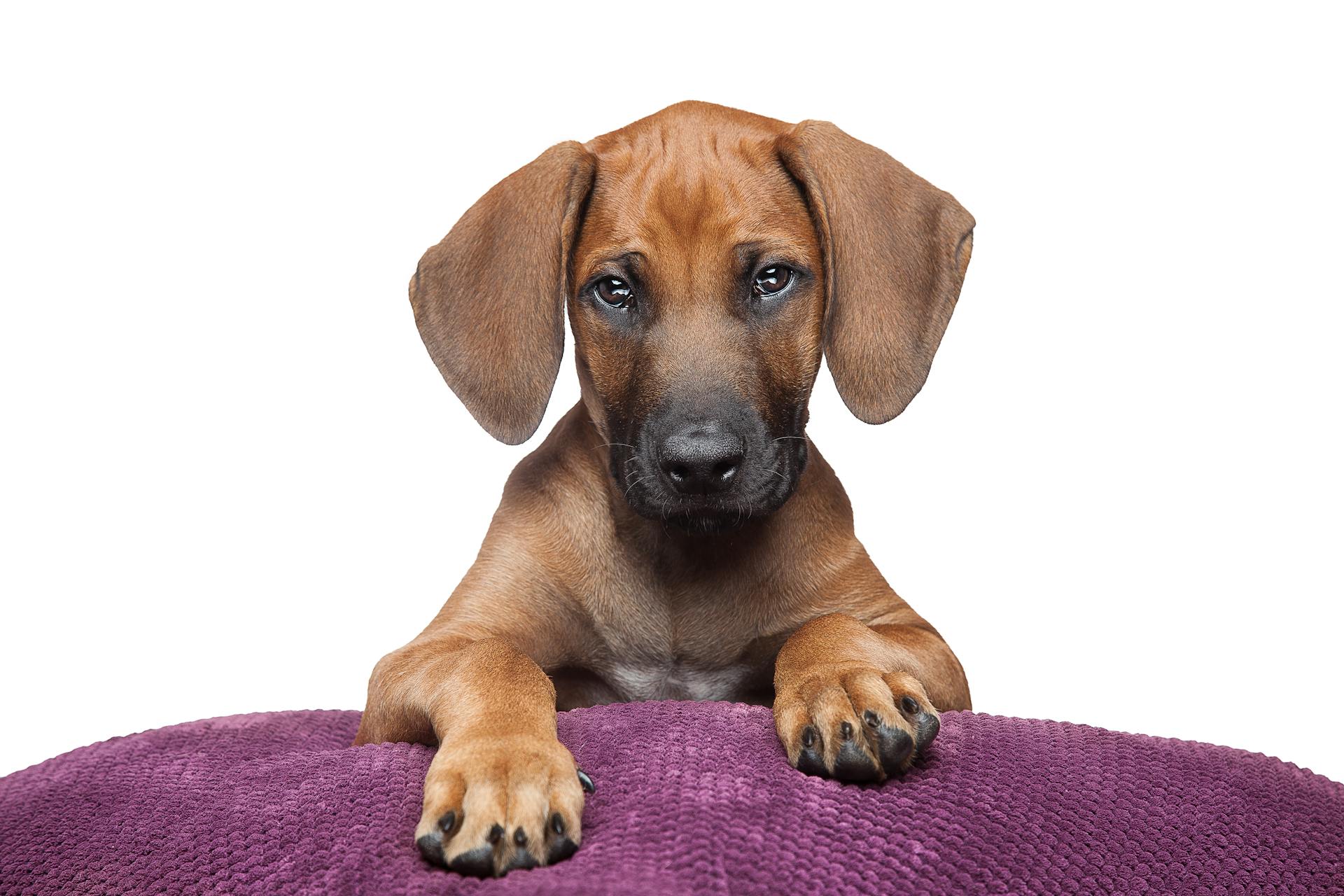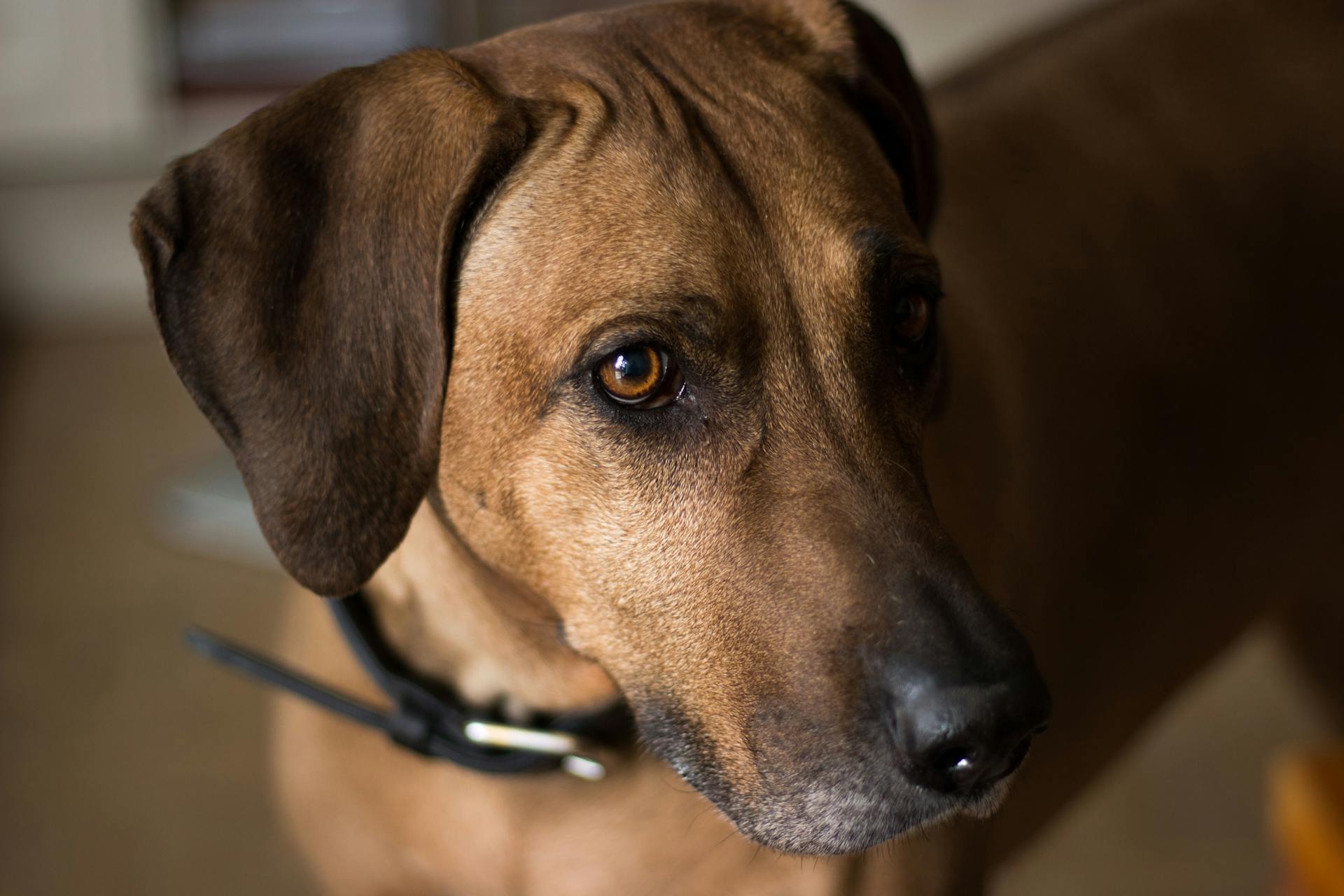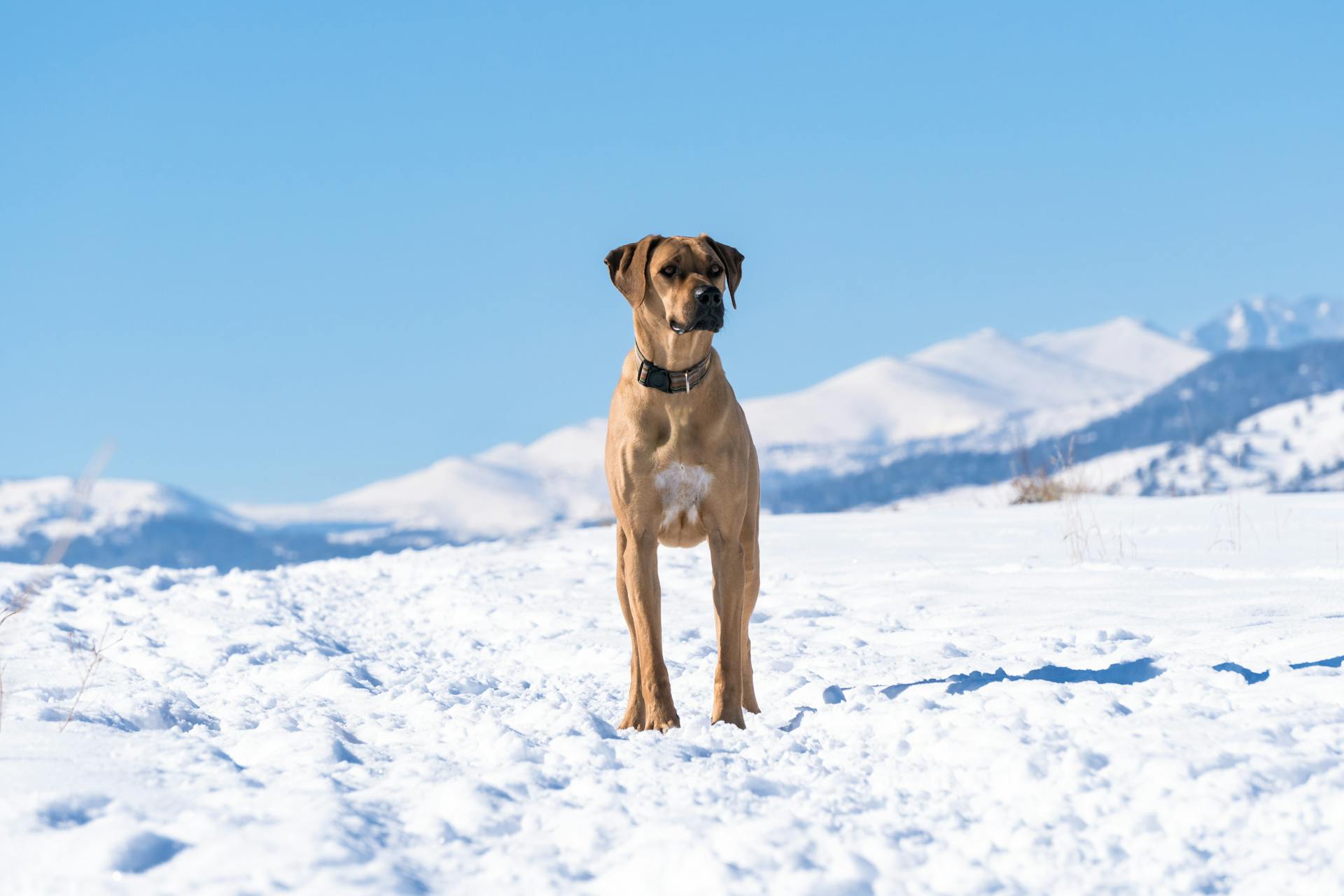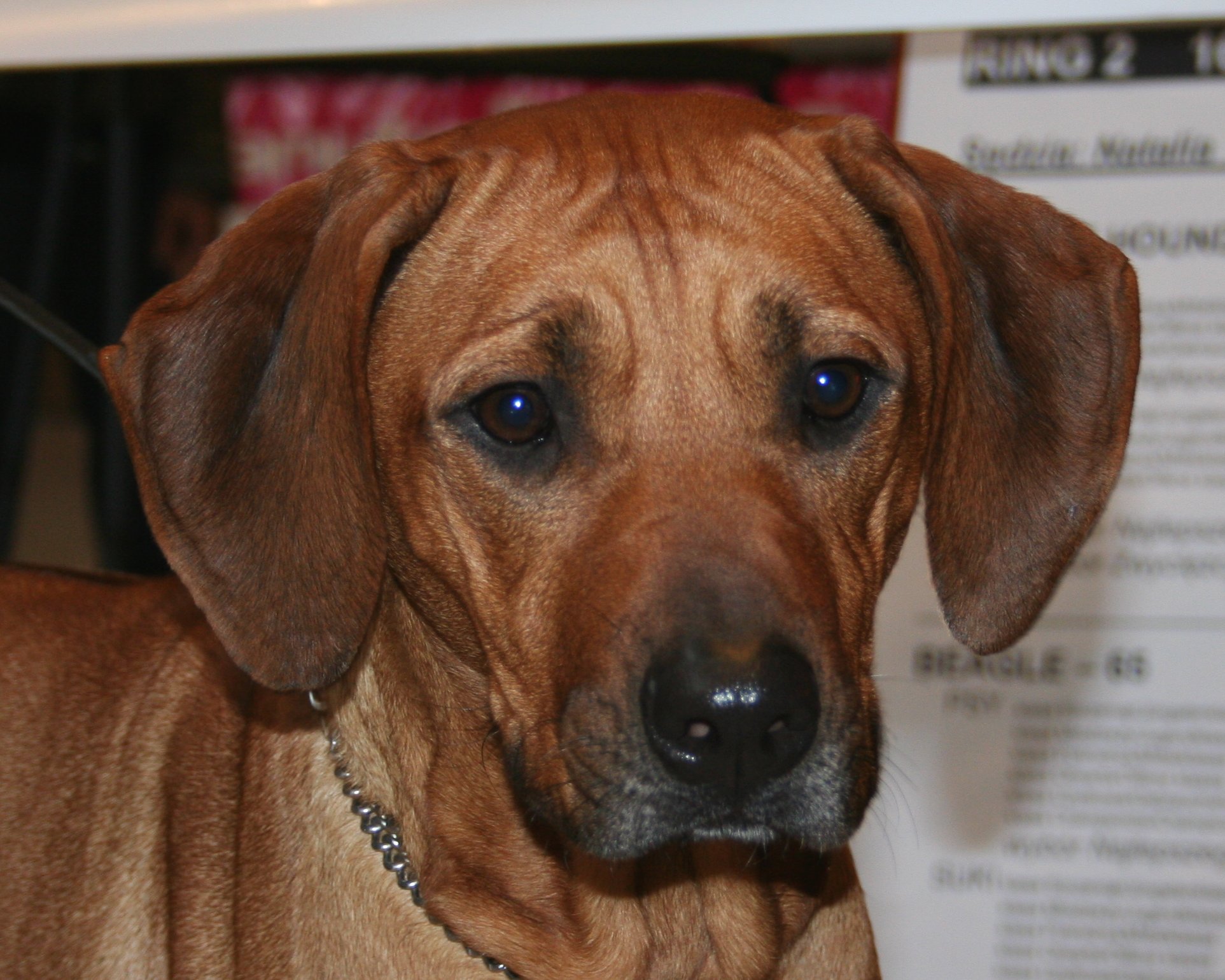
The Rhodesian Ridgeback and German Shepherd are two popular breeds that often get compared. The Rhodesian Ridgeback originated in Africa, specifically in what is now Zimbabwe, where it was bred to hunt lions and other large game.
The German Shepherd, on the other hand, was developed in Germany in the late 1800s for herding and guarding. Despite their different origins, both breeds have become beloved family pets and working dogs.
One of the most noticeable differences between the two breeds is their appearance. The Rhodesian Ridgeback has a distinctive ridge of hair running along its back in the opposite direction of its coat, while the German Shepherd has a double coat that sheds heavily.
Both breeds are intelligent and trainable, but they have different energy levels. The Rhodesian Ridgeback is a relatively calm and laid-back breed, while the German Shepherd is high-energy and requires regular exercise to stay happy and healthy.
Take a look at this: Straight Backed German Shepherds
Personality and Temperament
Rhodesian Ridgebacks and German Shepherds are both known for their loyal and protective nature, but they have some key differences when it comes to their personality and temperament.
Rhodesian Ridgebacks are independent and confident dogs, but they can be aloof with strangers and require early training and socialization to prevent aggression. They're naturally protective of their family and have a strong prey drive, which means they may chase smaller animals.
German Shepherds, on the other hand, are intensely loyal to their families and have a strong instinct to protect them. They're also highly intelligent and easy to train, but they can be wary of strangers and require proper socialization from an early age.
Both breeds are highly perceptive and sensitive to their environment, which can make them great with kids and other pets if raised correctly. However, they can also be stubborn and independent, making training a challenge.
Here's a comparison of the two breeds' temperament traits:
As you can see, both breeds share many similarities, but Rhodesian Ridgebacks tend to be more independent and have a stronger prey drive. German Shepherds, on the other hand, are more eager to please and require more social interaction.
Ultimately, the right breed for you will depend on your lifestyle and what you're looking for in a companion. If you're an active family looking for a loyal and protective dog, a Rhodesian Ridgeback or German Shepherd may be a great fit. But if you're a first-time dog owner or have a busy schedule, you may want to consider a breed that's easier to train and more adaptable to new situations.
Care and Health
The Rhodesian Ridgeback and German Shepherd are both large breeds that require regular veterinary check-ups to stay healthy. The average lifespan of a Rhodesian Ridgeback is 10-12 years, while a German Shepherd's average lifespan is 9-13 years.
Both breeds are prone to hip and elbow dysplasia, which can lead to arthritis and mobility issues. Regular exercise and a balanced diet can help prevent these conditions. However, some Rhodesian Ridgebacks may also experience thyroid issues and eye abnormalities.
Here are some common health issues that can affect Rhodesian Ridgebacks and German Shepherds:
Both breeds require regular grooming, including weekly brushing and occasional bathing. Regular nail trimming and ear checks can also help prevent health issues.
Care

The Rhodesian Ridgeback is a relatively healthy breed with few health issues, but some common problems include hip dysplasia, elbow dysplasia, and thyroid disorders.
These dogs require regular exercise, but their grooming needs are minimal. A weekly brushing and occasional bathing are sufficient, and many owners get away with not grooming them at all, especially outside of shedding season.
Their nails should be trimmed regularly, and their ears should be checked for infections.
They are extremely intelligent and need a lot of mental stimulation to prevent destructive behaviors. A large, fenced-in yard is highly recommended for these dogs, as they love to run.
Take a look at this: Grooming a German Wirehaired Pointer
Health Issues
Rhodesian Ridgebacks are generally healthy dogs with few genetic health issues. However, they can be prone to hip and elbow dysplasia, which is a common problem in large breed dogs.
Some Rhodesian Ridgebacks may also experience thyroid issues and eye abnormalities. Regular check-ups with a veterinarian can help identify these problems early on.
Recommended read: Rhodesian Ridgeback Health Problems

Hip and elbow dysplasia are two of the most common health issues affecting Rhodesian Ridgebacks. This is why it's essential to have your dog evaluated annually for these conditions.
Here are some specific health issues that can affect Rhodesian Ridgebacks:
- Hip dysplasia
- Elbow dysplasia
- Eye issues
- Cardiac issues
- Autoimmune thyroiditis
- Congenital deafness
It's essential to work with a responsible breeder who has pre-tested their parent dogs for these health issues. This can help ensure that your Rhodesian Ridgeback is less likely to experience these problems.
Weight Management
Weight management is a crucial aspect of caring for your dog's overall health. The amount of food your dog eats plays a significant role in this.
The Rhodesian Ridgeback requires 2 3/4 to 4 3/8 cups of high-quality food per day, divided into two meals. This is a substantial amount, and it's essential to monitor their food intake to prevent overfeeding.
The German Shepherd and Hovawart, on the other hand, need 3 to 4 cups of high-quality dry food per day, divided into two meals. This is also a considerable amount, and it's vital to ensure they're not overeating.
Expand your knowledge: 4 Months Dogo Argentino Puppy
The risk of obesity varies among breeds. The Rhodesian Ridgeback has an average risk for obesity, while the German Shepherd has a low to average risk. The Hovawart also has an average risk for obesity.
Here's a comparison of the breeds' average daily food consumption:
Trainability and Intelligence
The Rhodesian Ridgeback and German Shepherd are both intelligent breeds, but they have different levels of trainability and intelligence. The Rhodesian Ridgeback is considered to be relatively easy to train, but they can be stubborn and independent at times.
Both breeds require strong and consistent training from an early age, especially when it comes to their guarding and protecting instincts. This is crucial to help them cope with strange people and animals.
The German Shepherd, on the other hand, is considered to be one of the brightest dog breeds, making them easy to train. They thrive on mental and physical stimulation, and they need to be involved in their owner's life.
You might like: Training for German Shepherds
Here's a comparison of the trainability and intelligence of the Rhodesian Ridgeback, German Shepherd, and Hovawart:
As you can see, the German Shepherd stands out in terms of intelligence and trainability. However, the Rhodesian Ridgeback is still a highly trainable breed, and with patience and consistency, they can learn a wide range of commands and tricks.
Physical Characteristics
The Rhodesian Ridgeback and German Shepherd are both large dog breeds, with the Rhodesian Ridgeback typically standing 24 to 27 inches tall.
The German Shepherd, on the other hand, stands 22 to 26 inches tall.
Females of both breeds tend to be slightly lighter and shorter than males.
Rhodesian Ridgebacks weigh 75 to 80 pounds, while German Shepherds weigh 65 to 90 pounds.
Physical Measurements
The Rhodesian Ridgeback and German Shepherd are both large dog breeds, but they have some key differences in their physical measurements.
The Rhodesian Ridgeback typically stands between 24 to 27 inches tall, with females being slightly shorter and lighter than males.
Both breeds are similar in height, with the German Shepherd standing between 22 to 26 inches tall.
However, the Rhodesian Ridgeback tends to be lighter in weight, weighing between 75 to 80 pounds, while the German Shepherd weighs between 65 to 90 pounds.
Females of both breeds tend to be slightly lighter and shorter than males.
Coat Type, Shedding & Grooming
The Rhodesian Ridgeback has a short coat that sheds somewhat year-round and more heavily seasonally. Regular weekly brushing can help keep shedding under control.
Rhodesian Ridgebacks are clean dogs naturally and will do just fine with the occasional bath. They have a single layer coat with a famous "ridge" of fur along the length of the spine.
German Shepherds, on the other hand, have a thick, medium-length fur coat that is double layered. The upper layer is coarser fur that has water-resistant properties.
German Shepherds do shed year-round and can shed profusely with the seasonal shifts. This is called "coat blow" and it's something GSD owners are often unprepared for.
Here's a comparison of the coat types and shedding levels of the three breeds:
The Hovawart has a silky coat that doesn't require a lot of grooming. They shed moderately, but regular brushing can help keep shedding under control.
In general, the Rhodesian Ridgeback is the easiest to maintain, requiring minimal grooming. The German Shepherd requires average grooming effort, while the Hovawart is easy to groom.
You might enjoy: German Hovawart
Behavior and Adaptability
Rhodesian Ridgebacks adapt well to lifestyle changes and different living environments, making them a great fit for families with varying schedules. They're also happy to adapt to a family member being at home during the day or if their workplace is dog-friendly.
However, German Shepherds are even more adaptable, exceling in basically all living environments. This makes them a great choice for families who value flexibility and are willing to adapt their lifestyle to accommodate their dog's needs.
In terms of independence, both Rhodesian Ridgebacks and Hovawarts do best when a family member is at home during the day or if their workplace is dog-friendly. This suggests that both breeds require regular interaction and attention to prevent separation anxiety.
Here's a quick comparison of the three breeds' adaptability and independence:
Barking
Both the German Shepherd and Rhodesian Ridgeback are not big barkers. They tend to bark rarely and only in situations where there's a definite necessity.
The German Shepherd's calm demeanor and focused nature contribute to its low barking frequency. This makes them a great choice for families who live in apartments or have noise restrictions.
In contrast, the Rhodesian Ridgeback's barking is more situational, often triggered by its strong prey drive and territorial instincts. This means they may bark more frequently when they sense potential threats or intruders.
Related reading: Rhodesian Ridgeback Bark
Adaptability and Independence
When adapting to new situations, some dog breeds stand out for their ability to adjust. Rhodesian Ridgeback dogs adapt well to lifestyle changes and different living environments.
One key aspect of adaptability is how a dog handles being left alone. Rhodesian Ridgeback dogs do best when a family member is at home during the day or if their workplace is dog-friendly.

If you're considering a German Shepherd or Hovawart, you'll be pleased to know they're both highly adaptable to lifestyle changes and various living environments.
In fact, German Shepherd and Hovawart dogs adapt very well to lifestyle changes and basically all living environments.
If you have to leave your dog alone, it's worth noting that German Shepherd dogs are prone to panic, cry, bark, and whine when left by their owner.
Here's a comparison of the three breeds' adaptability and independence:
Family and Lifestyle
Rhodesian Ridgebacks and German Shepherds can make wonderful family dogs. However, they require a lot of training and socialization in their first few months.
Rhodesian Ridgebacks are generally great with children of all ages, but they can be challenging for first-time dog owners. Proper socialization and training are crucial to ensure they adjust well to family life.
German Shepherds are incredibly loyal and loving with their people and kids of all ages, but they too need proper training and socialization to learn how to be gentle and appropriate with young children and people of all ages.
Both breeds need a significant amount of exercise every day, making them unsuitable for people who live in apartments.
Recommended read: Are German Shepherds Good for First Time Owners
Family-Friendly
If you're looking for a loyal companion for your family, both Rhodesian Ridgebacks and German Shepherds are great options. They're wonderful with children, affectionate, and have an innate protective instinct, making them great family dogs.
Rhodesian Ridgebacks are generally protective of and gentle with family members of all ages, including young children, but they need a lot of training and socialization in their first few months. This means they're not recommended for first-time dog owners.
GSDs are incredibly loyal and loving with their people and with kids of all ages, but it's essential to ensure they're properly trained and socialized to learn how to be gentle and appropriate with young children and people of all ages.
These breeds need a significant amount of exercise every day, so if you live in an apartment, they might not be the best fit. They require a lot of room to run around and play, which is essential for their physical and mental well-being.
Check this out: Bernese Mountain Dog Guard
Availability

If you're considering bringing a new furry friend into your family, you'll want to think about their availability. The Rhodesian Ridgeback is quite easy to get, making it a very frequent breed to find.
The German Shepherd is also very easy to get, so you won't have to look too hard to find one. Availability-wise, the Rhodesian Ridgeback and German Shepherd are tied for the easiest to get.
On the other hand, the Hovawart is a bit harder to come by, but it's still a commonly available dog breed. This means you might need to do a bit more legwork to find one.
Here's a quick rundown of the breeds' availability:
Remember, availability can vary depending on your location and the breeder or rescue organization you're working with.
Frequently Asked Questions
Is a Rhodesian Ridgeback a strong dog?
Yes, Rhodesian Ridgebacks are strong and muscular hounds, known for their impressive size and weight. Males can weigh up to 85 pounds, while females typically weigh around 70 pounds.
Sources
- https://be.chewy.com/dog-breeds/compare/rhodesian-ridgeback-vs-german-shepherd/
- https://www.dogster.com/dog-breeds/rhodesian-ridgeback-vs-german-shepherd
- https://www.hepper.com/rhodesian-ridgeback-vs-german-shepherd/
- https://www.anythinggermanshepherd.com/rhodesian-ridgeback-vs-german-shepherd/
- https://dogell.com/en/compare-dog-breeds/rhodesian-ridgeback-vs-german-shepherd-vs-hovawart
Featured Images: pexels.com


